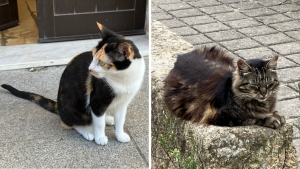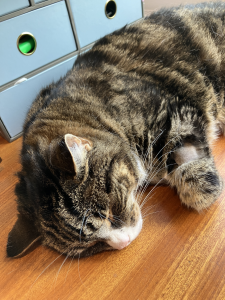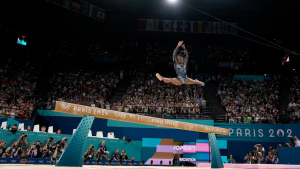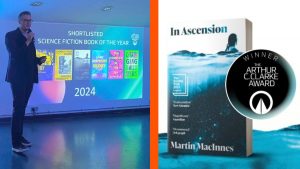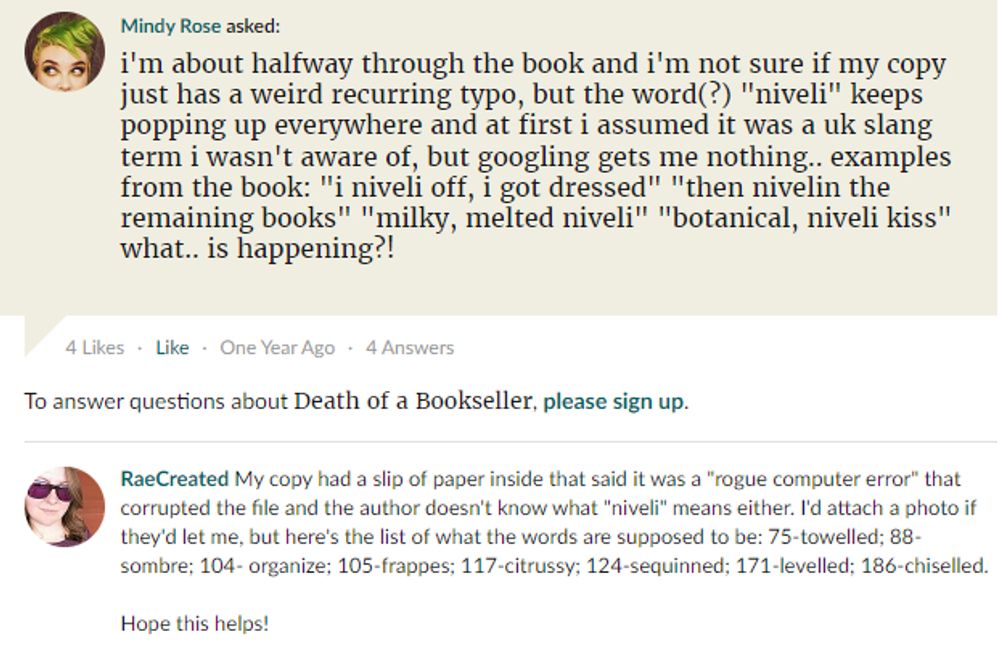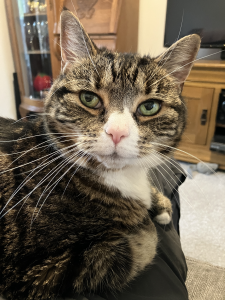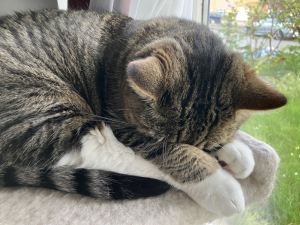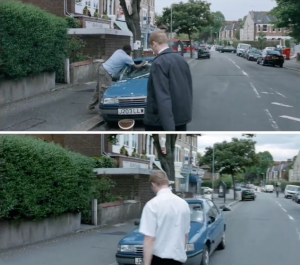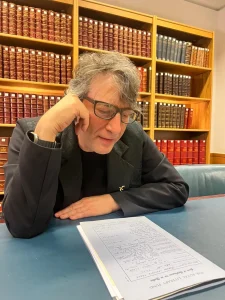Good comedy does not have to be a four-laughs-a-minute joke-fest. It can be more than that.
This post will contain spoilers for Mackenzie Crook’s beautiful Small Prophets. If you haven’t already seen it and you care about spoilers, stop right now and go watch it.
At the end of a drowsy south Manchester cul-de-sac, Michael Sleep’s life is at a standstill. It’s been at a standstill since his girlfriend, Clea, disappeared seven years ago. Michael (Pearce Quigley) works at a job he hates, which he makes tolerably by tormenting his ineffectual boss, Gordon (Mackenzie Crook), winding customers up, and constantly nipping off to his elderly father’s care home to help them sort out whatever it is that his dad’s done now.
It’s during one of these visits that his father, Brian (Michael Palin), explains that there is a way to find out what happened to Clea. A very unlikely way, but one guaranteed to give Michael the truth, if he can make it work. Over six episodes, Michael follows his father’s instructions to grow homunculi in jars of water, nurturing them until they reach a “state of divination”, at which point he can ask any question he likes and they have to tell him the truth.
Helping him, much against his wishes at first, is co-worker Kacey (Lauren Patel), whose own life has stalled. Kacey can’t move forward because her dream — acting in Neighbours — is so ridiculous that she feels embarrassed even articulating it. Her goal is so far away, both literally and metaphorically, that she can’t find a way to take the first step towards it.
Small Prophets mines the same vein that Crook explored in the wonderful Detectorists, a gentle poking about into people’s mundane lives and impossible dreams. In Detectorists, Andy (Mackenzie Crook) and Lance (Toby Jones) dream of finding a royal Saxon ship-burial on a local farm. As the series progresses, we find out that it is, indeed, there to be found, but can they? And can they beat their hated rivals, the Antiquisearchers, to the discovery and the triumph and the glory?
Also connected, in my mind at least, is The Ballad of Wallis Island, written by and staring Tim Key and Tom Basden. Another gentle look at loss and grief and friendship and the impossible necessity of learning to move on, which comes packaged as a romcom but really isn’t. Don’t get me wrong, I love a good romcom, but all the romcommy set-up turns out to be the foundations of a much deeper, more wistful and moving story.
Quigley, Key, and Jones all bring a very similar energy to their roles — men who are lost without the women that they adored, able to survive but unable to truly live, struggling to move on and find new meaning on their own. (There’s a whole digression here to be had about gender, but I’m going to resist that for now.)
But what also connects all of these productions is that they are not quick-fire comedies. They are heartwarming, cosy, moving, touching. Slow. Perhaps even ponderous. There are few belly laughs in any of them, particularly Detectorists which specialises in a more wry style of humour.
Small Prophets has some hilarious moments, but the belly laugh is not its bread and butter. The story is a blossoming flower, taking its time to reveal its inner beauty. And it really does take its time. Not to put too fine a point on it, but almost nothing happens in the entire six episodes. And some things that do happen feel like they ought to be the set-up for something else, and maybe they will be explained in the next series, but they come to nothing in this one. What, precisely is the significance of the rabbit-shaped oil slick? Is there one? Or it is just a little whimsy to be enjoyed on its own terms?
You could summarise Small Prophets in a few paragraphs and not miss any action out. Yet, if you did, you’d be missing out everything that’s important. The slow development of Michael and Kacey’s friendship — and oh, how marvellous is it to have a show that centres a friendship, not a romance! — and Michael’s dawning realisation that his father’s instructions aren’t the wild imaginings of a man losing his memory and his mind to age. These are things that need time, that can’t be hurried, and Crook’s pacing here is perfect. He does not allow the story to be rushed.
What commissioners want
Here’s the thing, though: Small Prophets, Detectorists and The Ballad of Wallis Island were all fabulously successful, but they are not what we are told commissioners want, or what comedy competitions say that they want. Rather, we are told, they are looking for scripts with what you might call a high joke density.
“Sitcom audiences will expect about 3 to 4 laugh moments per page,” said the first round of feedback I got on Fieldwork from one competition. And you will see this advice repeated ad nauseam and all over the place. More jokes. More funny. Now. Now. Now.
But if a page of script is about one minute of time, show me, right now, the “3 to 4 laugh moments” in the first minute of any of these three productions. Small Prophets has none. Detectorists may have one, depending on whether you believe “Three shotgun caps and a Blakey” is a punchline. This first minute or two of The Ballad of Wallis Island is music, and the first bit of actual comedy is physical, at about 2 to 3 minutes in.
Now look at the love that these stories have engendered. People adore them. But they’d never get made if they weren’t powered by existing talent. Yes, The Ballad of Wallis Island started off as a short film and took 18 years to develop into a movie, although most of that time was spent not actually working on the film but doing other stuff that put them in the position to then make the film.
Would Small Prophets or Detectorists have been made if they weren’t Mackenzie Crook’s projects? What kind of feedback would those scripts have had, had they been entered into any of the comedy competitions out there? “Not enough jokes. This is a sitcom!!!!!” probably. (Ask me how I know.) (No, actually, don’t.)
Cosy comedy vs “horrible people being horrible to one another”
The tradition that comedy is “horrible people being horrible to one another”, as one expert put it to me last year, is one with a long history. Hancock’s Half Hour and Steptoe & Son becomes Only Fools & Horses becomes The Office, Amandaland, Such Brave Girls. But I can’t stomach that.
I don’t go to comedy to be made to cringe, or made to feel disgust at someone’s awful behaviour. I don’t want to see someone getting away with being a dickhead. I need a haven away from that, because there’s enough of that *gestures wildly* out there already. The news is already full of it.
I want to see nice but flawed people doing their best, getting it wrong repeatedly and hilariously, but becoming a better person in the process. Ted Lasso, Schitt’s Creek, The Good Place all feature some really awful characters, but their awfulness is understandable and, most importantly, redeemed. They become better people.
The almost mortally wounded Rebecca Welton, dragged through the gutter press by her slimy ex-husband, wants to burn down Richmond AFC to spite him. But she balks at key moments, eventually learning that you can’t just fuck with innocent people’s lives and that making the club successful is the best revenge.
The entire Schitt family are entitled narcissists in the first few episodes, and I admit I struggled to keep going, but over the six season run, they all soften, become better people, learn to respect those who aren’t like them and to see that those they thought were friends are actually morally bankrupt assholes. The entire show is about lowering the barriers that being rich erects and becoming better, more grounded, kinder people in the process.
And The Good Place is about another awfully wounded woman, Eleanor Shellstrop, literally learning to become a good person. And succeeding. They all do – Chidi, Jason, Tahani, and goddamit, even the evil demons. They all learn to be better people.
Ted Lasso, Schitt’s Creek, The Good Place all have much higher joke density than Small Prophets, Detectorists and The Ballad of Wallis Island, but they all have, at their core, a belief that people are good, not horrible. People that are struggling can act out, yes, but they can also change and become a better version of themselves. Their wounds can heal. They become good, kind, selfless people.
I want comedy that is gentle, with plenty of open questions to keep our curiosity going but really only the barest hint of actual tension and absolutely zero cringe. I want comedy to be allowed to be cosy in the same way that someone being murdered by a terrible awful murderer person who is apprehended without anyone spilling a drop of tea is perfectly acceptable cosy crime. I want comedy that is allowed to unfurl at its own pace, which might be quick or might, indeed, be really quite slow.
Too many scripts
So why, then, are script competitions still banging on about 3-4 jokes per page?
I watched Not Going Out recently, having never watched it before, and I could see how poorly it was served by the intense pressure to cram as many jokes in as possible. Much of the dialogue was joke-shaped, but it wasn’t funny. I could see the set up, the reinforced pattern and the punchline — or the construct, confirm and confound as Joel Morris would put it — but it didn’t hang together properly. I was left thinking, “Oh, you expected a laugh there. OK.”
I have seen that with other shows too. A few months ago, there was some lauded adult humour cartoon thing on in the background whilst we were cooking dinner and I could hear the joke-shaped words, could catch the lingering sound of “Oh, if we just put this dialogue in here, it’ll be really funny”. Except it wasn’t. There was a hole where the funny ought to be.
I mean, Not Going Out works for enough people that it keeps getting made, and that’s fine. Not everything has to be for me. But it should be able to exist alongside other types of comedy show for people with other senses of humour. Yet I get no sense that it’s currently possible for multiple styles of humour to be served by multiple styles of show, because nothing else seems to get through to production.
The Detectorists script would be absolutely excoriated if it was entered into some of the comedy script comps that we’re all supposed to enter if we want a chance of breaking into the industry. (Top tip: It doesn’t work like that.) Small Prophets would be met with blank incomprehension.
Why?
I think there comes a point where script readers, and perhaps some writers, have just read too many scripts. They are oversaturated. It’s like semantic satiation – if you repeat a word often enough your brain stops seeing it as a word and instead it becomes a meaningless sound.
I think, after a while, if you read too many scripts then they all bleed into one giant episode of semantic satiation. Reading itself becomes a check-box exercise. Are there 3-4 jokes on page 1? Are the stakes explained immediately? Are the main characters obnoxious enough? Are they in sync wiv da yoof? Is the dialogue zippy enough? Is there a turning point on page whatever? Does stuff happen at breakneck fucking pace?
The readers aren’t reading for potential, they’re reading for familiarity. Does this thing look like all the other things we know have been successful, and therefore is more likely to also be successful? Is this the next Fleabag? Although let’s fucking face it, Fleabag is ten years old and not even Phoebe Waller-Bridge could write another one. She’s only just managed to write Tomb Raider, after six years of trying. I mean, give me $20 million and I’d hire the best writers I know and we’d give you ten things that are better than a rehash of some old game.
It’s a fucking cargo cult.
I don’t have any answers, but I do have several years worth of pent-up frustration about the mess that is the entire UK creative industries. So hey, welcome to my brain.
But
Mackenzie Crook is a fucking national treasure and I am absolutely fucking delighted that he is able to make shows like Detectorists and Small Prophets, because now other people can point to his success and say, “My work is in the same vein.” And maybe, then, someone might take find a way to take seriously the idea that comedy does not have to be a gag a minute belly-laugh-fest in order for it to work and be loved by an audience.
When someone told me that Fieldwork read “like a cross between Detectorists and The Archers”, I was absolutely delighted. I’ve struggled, since, trying to work out how to make it ‘funnier’, but Small Prophets shows me I don’t need to. I do need to make changes to the pilot, because it’s still not quite there, but I won’t be losing any sleep worrying about whether it’s funny enough or not.
Is it compelling? Do people connect with it? Does it say something people want to hear?
In an ideal world, the success of Small Prophets would encourage perhaps a broader approach to defining comedy, with perhaps a few less strictures about how many jokes over how many pages and blah-di-blah-di-blah. Maybe we might see a few more shows that have character and heart and stories that are told in the time it takes to tell them. Maybe those of us who like cosy comedy will find ourselves with more wonderful shows to watch.
Whatever happens, I do need to end by pointing out that however good it is, and it is good, Ludwig is still not a fucking comedy. It’s cosy crime. And I will not be taking questions at this time.
{ Comments on this entry are closed }

